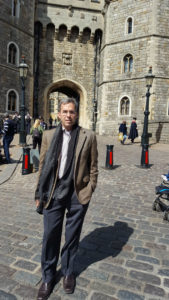Research in the Round Tower: Report from Rick Atkinson
by Rick Atkinson
I’ve worked in some exotic locations—Mogadishu, Mali, Baghdad, Kazakhstan, Riyadh—but none more evocative than the top of the Round Tower in Windsor Castle, where I spent the month of April 2016, as a Georgian Papers fellow. The researcher’s path to this archive is steep: through the Henry VIII Gate and the Norman Gatehouse, up 102 stone steps in the Round Tower and then another 21 wooden steps to the reading room. It’s as close to time travel as I’ve ever experienced.
As an author and a military historian from Washington, D.C., I’m working on a trilogy about the American Revolution. My previous books have been about four 20th century wars, each of them expeditionary, and I’m intrigued by the challenges of waging war at great distance in the 18th century. In the official and private papers of George III, complemented by the vast trove of Treasury, Colonial Office, Admiralty, War Office, and Audit Office documents in the National Archive at Kew, the depth and breadth of those challenges comes clear. So does the extent to which the King is closely involved in all aspects of logistics, politics, strategy, diplomacy, naval affairs, and intelligence collection during the Revolution. His appetite for information is enormous. What he knows is impressive; what he doesn’t know will help cost Britain her American colonies.
The American stereotype of a tyrannical nincompoop quickly dissolves with a little exposure to the Georgian papers. I also spent time examining the correspondence and documents of Queen Charlotte and two eventual heirs to the throne, George IV and William IV. In these papers we see the worries and preoccupations of a husband and father, and of a monarch wrestling with the fretful issue of how to prepare a prince to become a king in a changing world. I also took several days to examine the military maps of George III in the Print Room and to examine some of the King’s personal holdings in the Royal Library.
I couldn’t be more grateful to those responsible for opening up the Georgian Papers and giving us a deeper look at this extraordinary period in our common heritage, particularly King’s College London and the Omohundro Institute. Oliver Urquhart Irvine, the Librarian and Assistant Keeper of the Queen’s Archive, and his colleagues at Windsor Castle, were extraordinarily generous, accommodating, and good-humored. Not least, I was in Windsor for the Queen’s 90th birthday celebration. I told Oliver that the irony was not lost on me that I had interrupted my research on the Revolution to stand on a street curb with thousands of others to sing “Happy birthday, your Majesty.”


[…] Rick Atkinson, military historian and one of the US research fellows, said the papers set out “the extent to which the King is closely involved in all aspects of logistics, politics, strategy, diplomacy, naval affairs, and intelligence collection during the Revolution. His appetite for information is enormous. […]
[…] Institute’s Georgian Papers Programme fellows; he arrived at the Royal Archives at Windsor, making his way up into the Round Tower, in the spring of 2016. It’s a particular delight to see research supported by the Programme […]